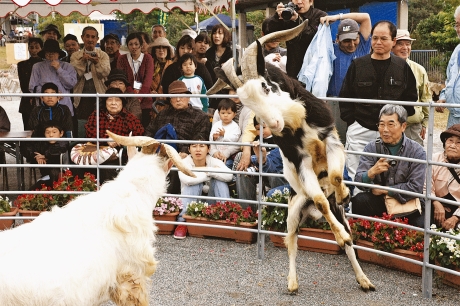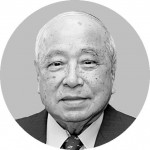Top News

March 16, 2011, Ryukyu Shimpo
On March 12, many people came to enjoy a goat-fighting, or Hijaorase (Okinawan dialect) event, held annually at the Katsuyama Community Center, Nago City, in the northern part in Okinawa. Two goats butted each other violently in a ring approximately six meters in diameter. The goats lifted their front legs up and swung their horns down on to each other repeatedly with a loud whack. The spectators sitting on the other side of a fence around the ring were enthralled by the contest.
Yokozuna (Grand Champion) Shikuwasa, aged six years old, met the challenge of his three year-old son Sandaguwa in the main bout. Despite the youngster’s physical superiority, Shikuwasa maintained his dignity, defeating his son using his well-refined fighting technique.
During the opening ceremony, people offered a silent prayer for those who perished in the earthquake and tsunami that occurred in the northeast of Japan on March 11. Spectators also gave donations for the disaster victims.
(English Translation by T&CT, Mark Ealey)
Go TO Japanese
March 18, 2011, Ryukyu Shimpo
Following the Great East Japan Earthquake, growing numbers of people from the Tohoku and Kanto areas have been taking refuge in Okinawa in order to escape from a spate of aftershocks and the ongoing threat of a nuclear accident.
Staff at the Okinawa Tourist Information Center state that they have received numerous inquiries about long-stay accommodation facilities and flights since March 11, when the earthquake occurred.
The Center received about 200 inquiries on March 16, and about 100 on March 17. Most of the people contacting the Center normally reside in areas affected by the earthquake.
A car rental information office in Naha Airport reported that although many people had cancelled reservations for rental cars directly after the earthquake, increasing numbers of people were using rental cars since March 16.
A female worker said that the number of customers had increased about five-fold in comparison with normal circumstances.
Currently, such cities as Naha, located close to the airport, have been receiving an avalanche of inquiries about occupancy of short-term lease condominium accommodation within Okinawa. These people tend to be family members of people who live in the area around Tokyo, and are seeking temporary refuge.
A man who evacuated from Fukushima Prefecture with his wife and children said, “There are no food supplies or gasoline and the nuclear power plant is still in a dangerous situation. We moved to Okinawa to be safe. We don’t know how long we are going to stay.”
(English Translation by T&CT, Mark Ealey)
Go To Japanese
Steadily growing number of customers from overseas
March 17, 2011, Ryukyu Shimpo
According to figures released by the Okinawa Prefectural Government Department of Tourism, Commerce & Industry, 8189 couples were married at resort hotels in Okinawa last year. This represents a 2.0% increase (143 couples) over the previous year, 2009, with the number of couples from overseas, especially from places such as Taiwan or Hong Kong, now on an upward trend.
Although the number of such couples getting married in Okinawa decreased in consecutive years for the first time in 2009 due to the economic downturn and the new strain of influenza virus, it subsequently rebounded, reaching the second highest figure since statistics began to be compiled in 1999, next to that for 2008 (9001 couples).
The statistics are based on a survey conducted with 61 companies promoting resort weddings, 33 of which submitted responses.
The number of customers from the main islands of Japan increased by 1.0% (78 couples) to 7984. Centered on those from East Asian regions such as Taiwan and Hong Kong, the number of overseas customers increased by 46.4% (65 couples) to 205.
Taiwanese and Okinawan companies worked together to promote weddings in Okinawa. These efforts paid off, with the number of Taiwanese customers increasing 3.6 times to 59.
According to the Prefectural Government, 180000 people, a figure that includes the invited guests, visited Okinawa for resort weddings. Based on the calculation that each person spends 66000 yen within the prefecture, Okinawa’s total revenue from resort weddings is estimated to reach at least 14.5 billion yen.
Those carried out in Christian-style chapels are by far the most popular option, accounting for about 90% of wedding ceremonies. Those carried out against a backdrop of Okinawa’s beautiful blue seas are understandably on an upward trend.
Following the Great East Japan Earthquake, the Okinawan prefectural authorities have revised the target figures for the “Visit Okinawa Plan,” designed to promote tourism of Okinawa, down from the 10000 couples for resort weddings previously expected.
(English Translation by T&CT, Mark Ealey)
Go To Japanese

March 12, 2011, Ryukyu Shimpo
Former Governor of Okinawa Masahide Ota discusses what may lie behind the disparaging remarks about Okinawa made by Kevin Maher, who was subsequently removed from his position as Director of the Office of Japanese Affairs in the US State Department.
On my way back to the Peace Research Center in Naha, I learned through a special edition published by a local Okinawan newspaper that Kevin Maher, Director of the Office of Japanese Affairs at the US State Department, had been sacked for the highly discriminatory remarks he made about Okinawa and Japan in general.
Our office staff were so pleased that they shouted with joy when I told them the news – clearly this was no ordinary occurrence.
That Maher was removed from his position is no surprise. Not only did he put his foot in his mouth in this recent case, but he also has a track record of making such verbal gaffes – statements that undoubtedly represent his true feelings. Be that as it may, he still attempted to blame the students who took the notes on his lecture for misquoting him.
As it happens, those same students came to my Center in Naha, where I talked to them for about two hours about military bases in Okinawa. I found them to be serious young people, certainly not the kind of people who would produce irresponsible records of Maher’s comments. It also seems that the contents of their notes all matched.
Kevin Maher is the only consul general to serve in Okinawa whom locals demanded should to leave the islands due to his repeated provocative remarks during his posting there.
I met Maher when he was serving as a military security officer in the US Embassy in Tokyo. I made representations to him about settling the issue of the military bases in Okinawa, but found myself disagreeably surprised at his high-handed and one-sided remarks on the matter. I realized then that as long as he was in charge of security issues, the relationship between Japan and United States would only deteriorate, making it impossible for the matter of US military bases in Okinawa to be resolved.
Maher not seeing Okinawa as belonging to Japan, a sovereign nation meant that he was viewing it as either United States territory or occupied land, and so one can only assume that he must have viewed Japan as tributary nation of United States.
But we miss the true nature of the issue if we attribute the cause of this incident merely to Maher’s personal predilections. A key player in the negotiations on the US Marine Corps Air Station Futenma relocation plan, Maher is an advocate of moving the facilities in question to Cape Henoko in Nago City in the northern area of Okinawa, where Camp Schwab already exists. If we see this as an opportunity to highlight the reality of the situation in Okinawa, we should focus on the bigger issue that exists in the background, namely, that both the United States and Japanese governments implement discriminatory policy towards Okinawa. We need to ask ourselves for whom and for what was the Japan-US Security Treaty created and sustained and to carry out a comprehensive examination of the process of its coming into existence and its actual contribution to both countries. While the Treaty was concluded between the governments of the United States and Japan, it cannot be denied that they maintain it at the expense of Okinawa. The people of Japan should recognize this and move to do away with the treaty if it continues to place too great a burden on Okinawa.
Maher’s verbal gaffe reflects his frustration that the Futenma relocation plan, which he had been advocating, has not gone quite to plan. While we must of course take issue with his discriminatory remarks, it is even more important for us to look closely at the validity of the Futenma relocation plan, which Maher had been so fervently promoting. Both the United States and Japanese governments continue to claim that the US Marine Corps Air Station Futenma, which is currently located in the middle of a densely populated area, needs to be relocated to the more sparsely populated Cape Henoko, in Nago City. However, experience tells us that crime and accidents are by-products of military bases, so there is no guarantee that people’s lives will not be placed at risk if we build a new military base in Henoko. If we agree with the logic that holds that a single human life is more valuable than the earth itself, then every human life is of equal value. In that respect, the issue of relocating the military base should not be discussed in terms of the number of people who might, or might not, lose their lives due to crimes and accidents.
Since its reversion to Japanese sovereignty, Okinawa has witnessed more than 9000 crimes and accidents related to US military forces. Of those, 497 have been caused by US military aircraft, with US military personnel committing 5634 crimes and causing 2401 traffic accidents. Based on this reality, the rejection by the people of Okinawa of the relocation of the air station to Cape Henoko, reflects their acknowledgment of the equality of all human life.
Kevin Maher’s statements provide the people of the rest of Japan with an opportunity to share the same values with the people of Okinawa.
(English Translation by T&CT, Mark Ealey)


 Webcam(Kokusai Street)
Webcam(Kokusai Street)


